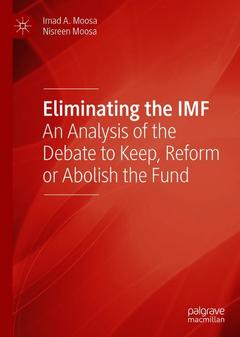Description
Eliminating the IMF, 1st ed. 2019
An Analysis of the Debate to Keep, Reform or Abolish the Fund
Authors: Moosa Imad A., Moosa Nisreen
Language: English
Subjects for Eliminating the IMF:
Approximative price 94.94 €
In Print (Delivery period: 15 days).
Add to cart178 p. · 14.8x21 cm · Hardback
Description
/li>Contents
/li>Biography
/li>Comment
/li>
This book offers a concise but thorough analysis of the International Monetary Fund reform debate. Since the advent of the Asian financial crisis in the late 1990s, a lengthy deliberation has ensued over whether the IMF should be reformed, abolished, or left as is. The authors approach this debate from a normative perspective while looking at arguments from all sides, as well as reflecting on the history, functions, and ideology of the IMF. This unique approach gives weight to the authors? perspectives and their conclusion that the IMF ultimately does more harm than good. Written to analyze and contribute to the current IMF debate, this Palgrave Pivot is a must-read for scholars and policymakers invested in the conversation surrounding IMF reform.
Imad A. Moosa is a Professor at RMIT, Australia. He has held several academic, professional and advisory positions in the UK, US and Australia, and he has written extensively on both economics and finance. Over the course of his career, he has published over 200 papers and 22 books, 11 of which were published with Palgrave.
Nisreen Moosa is a clinical health scientist who has turned into a health economist. She is completing her PhD on the financing of healthcare at the University of South Australia. Part of her research is on the effect of the IMF on health expenditure, particularly in developing countries.
Explores specific examples of how IMF operations have been detrimental to the welfare of people in developing countries
Considers arguments for keeping, abolishing, and reforming the IMF
Features criticisms of the IMF from both the left and right sides of the political spectrum




